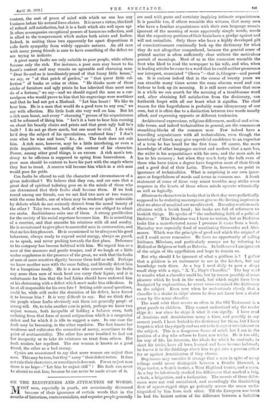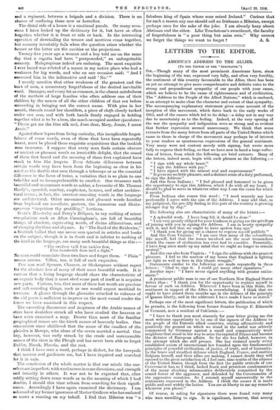ON THE ELUSIVENESS AND ATTRACTION OF WORDS.
MOST men, especially in youth, are occasionally distressed because of their ignorance of certain words that in the mouths of historians, controversialists, and superior people generally are used with gusto and certainty implying intimate acquaintance. It is possible too, if others resemble this witness, that many men
who have a familiar acquaintance with their own language remain ignorant of the meaning of some apparently simple words, words that the expository portions of their brain have a grudge against and will not assimilate. Only those who have a highly developed gift of conscientiousness continually look up the dictionary for what they do not altogether comprehend, because the general sense of printed matter is often sufficiently clear without the meticulous pursuit of meanings. Most of us in this connexion resemble the Scot who liked to read the newspaper to his wife, and who, when in leading articles he came to a word that he could neither pronounce nor interpret, enunciated " McBee "—that is, Glasgow—and passed on. It is curious indeed that in the course of twenty years we can stumble many times across the same obscure word and can forbear to look lip its meaning. It is still more curious that once in a while we can search for the meaning of a troublesome word and, after obtaining full satisfaction from the dictionary, can forthwith forget with all our heart what it signifies. The chief reason for this forgetfulness is probably some idiosyncrasy of our own, but it is often due to a distinction between two words usually allied, and expressing opposite or different tendencies.
Architectural expressions, religious differences, medical and scien- tific terms, and indeed technicalities in general, are the commonest stumbling-blocks of the common man Few indeed have a travelling acquaintance with all technicalities, even though the knowledge of Greek may give superficial confidence to an expositor of a term he has heard for the first time. Of course, the more knowledge of other languages ancient and modem that a man has, the wider is his acquaintance with his own, and the more aids he has to his memory ; but when they reach forty the bulk even of
those who have taken a degree have forgotten most of their Greek and a good deal of their Latin. There is, however, no point in ignorance of technicalities. What is surprising is our own ignor- ance or forgetfulness of words and terms in common use. A frank statement of some of these very minor troubles may strike some response in the hearts of those whose minds operate whimsically as well as logically.
Allusions to characters in books that in their day were pathetically supposed to be enduring masterpieces give us the fleeting impression that we alone of mankind are uncultivated. Macaulay scatters such allusions with a lavish hand ; his books are full of references to bookish things. He speaks of "the undoubting faith of a political Diafoirus." Who Diafoirus was I have no notion, but as Diafoirus looks like a manufactured name I presume it came from a book. Macaulay was especially fond of mentioning Oromasdes and Ahri-
manes. Which was the principle of good and which the original of evil I could never remember. He loses no opportunity of calling Irishmen Milasians, and particularly annoys me by referring to Holland or Belgium or both as Batavia. In both cases I am ignorant of the origin of the appellation and hope to remain so.
But why should I be ignorant of what a gridiron is ? I gather that a gridiron is an instrument in use in the kitchen, but my knowledge ends there. As a boy I used daily to pass a dingy small shop with a sign, "X. Y., Ship's Chandler." The boy wed to wonder what a chandler could be, but by reason possibly of some pleasure which he took in the word, but which might have been
dissipated by explanations, he never cross-examined the dictionary on the subject. Even now when he understands clearly that a chandler is a dealer in ships' stores he does not know how a dealer came by the name chandler.
The word selah that occurs so often in the Old Testament is a great puzzle to children. They cannot understand why the reader
skips it : nor since he skips it what it can signify. I have read
of Arminius and Arminianism many a time, and possibly in my earnest youth I have looked in the dictionary for them, but I have forgotten what they signify and am not to be tempted into interest on the subject. This is a dangerous frame of mind, but I am in the position of a dog who refuses to learn new tricks. He is too old; his way of life, his interests, the ideals for which he contends, in short his tricks, have all been learned and have become habitual ; he leaves it to the frisklings about him to get into a passion either for or against Arminianism if they choose.
Dog-lovers may consider it strange that a man in spite of many tellings could never distinguish between a Dandle Dinniont, a
Skye terrier, a Scotch terrier, a West Highland terrier, and a cairn.
As a boy he laboriously studied the differences that marked a brig, a bark, a brigantine, and a barkentine. The secrets of these diffdr-
ences were not well assimilated, and accordingly the diminishing fleet of square-rigged ships go patiently across the ocean undis- tinguished by him from each other. Till the European war burst he had the haziest notion of the difference between a battalion
and a regiment, between a brigade and a division. There is no dance of confusing these now or hereafter.
The distal side of a house is a continual puzzle. On many occa- sions I have looked up the dictionary for it, but have as often forgotten whether it is front or side or back. In the interesting operation of dovetailing the tenons and mortices come together, but memory invariably fails when the question arises whether the former or the latter are the cavities or the projections.
Twenty-five years ago a woman and a boy told me on the same day that a regatta had been " postponeded," an unforgettable memory. Malapropisms indeed are enduring. The most exquisite I ever beard was related of a mason in my native place who had a weakness for big words, and who on one occasion said: "And I answered him in the infirmative and said ' No.' " I merely mention that other weakness of the greatest and the Imat of men, a momentary forgetfulness of the desired inevitable word. Stranger, and every bit as common, is the absent-mindedness of the mothers of large families who often address one of their children by the names of all the other children of that sex before succeeding in bringing out the correct name. With pins in her mouth, threads round her shoulders, a piece of cloth closely tucked under one arm, and with both hands firmly engaged in holding together what is to be a hem, the much-occupied mother ejaculates: "Please get me the blue silk reel, Jean dear, Mary, Jessie, I mean Annie."
Against these lapses from living curiosity, this inexplicable forget- fulness of some words, even of those that have been repeatedly learnt., must be placed those exquisite acquisitions that the bookish YAM treasures.. I suppose that every man finds certain obscure or ancient or pleasant words an irresistible delight, that the sound of them first heard and the meaning of them first explained have stuck to him like limpets. Even delicate differences between certain words may have been from the beginning as clear in his rabid as the double star seen through a telescope or as the essential difference in the faces of twins, a variation that is so plain to one beholder and so incomprehensible to another. One treasures such beautiful and uncommon words as ashlar, a favourite of Mr. Thomas Erardy's, spandril, aumbry, emplecton, larmier, and other architec- tural terms ; in fact, the sweetest-sounding words in the language are architectural. Other uncommon and pleasant words familiar from boyhood are tessellate, pastern, the humorous and Shake- spearean " irnpcticos thy gratillity," hartizan.
Scott's Minstrelsy and Percy's Refiques, to say nothing of minor compilations such as Allan Cunningham's, are full of beautiful things, of obsolete, captivating words, of divine alliterations, and of clanging rhythms and rhymes. In "The Raid of the Reidswire," s Scottish 'ballad that one never sees quoted in articles and books on the subject, though it is in Scott and is inferior to nothing of the kind in the language, are many such beautiful things as this :— " The swallow taill free tackles flew,
Five hundredth flain intil a flight."
No man could enunciate these two lines and forget them. " Flain " means arrows. Villein too, is full of such exquisites.
Few can read Spenser, Chaucer, or Shakespeare without regret for the absolute loss of many of their most beautiful words. It is curious that a living language should share the characteristic of an organic body that it must shed some part of itself as it acquires new parts. Curious, too, that most of these lost words are gracious and soft-sounding things, such as one would expect mankind to teeasuie. A glance through the glossaries attached to volumes of the old poets is sufficient to impress on the most casual reader the hisses We have sustained in this respect.
The exceeding dissonance and inaptness of the Arabic names of Mars have doubtless struck all who have studied the heavens or have even examined a map. Dearer than most of the familiar geographical names arc the Greek names of heavenly bodies. One remembers since childhood that the name of the smallest of the preludes is /kierope, who alone of the seven married a mortal. One boy, however, was early struck by the crude and unreasonable names of the stars in tho Plough and has never been able to forget Dubho, Merak, Phecda, and the rest.
I think I have seen a word, perhaps in dialect, for the kneepads that masons and gardeners use, but I have inquired and searched for it in vain.
The conclusion of the whole matter is that our minds like our- selves are imperfect., with weaknesses in some directions, and strength and tenacity in others. It was not to be expected that, after coldly setting down some words as to the meaning of which I had doubts, I should this time refrain from searching for their signifi- cance. Accordingly I have again examined the dictionary. I am ashamed of my former ignorance of Master Gridiron who has endured ma many a roasting on my behalf. I find that Milesius was "a.
fabulous king of Spain whose sons seized Ireland." Curious that for such a reason any one should call an Irishman a Milesian, except perhaps once for the sake of the joke. I am already hazy about Ahriman and the other. Like Touchstone's sweetheart, the faculty of forgetfulness is "a poor thing but mine own." Why cannot we forget the things we want to forget ? A. S.































 Previous page
Previous page